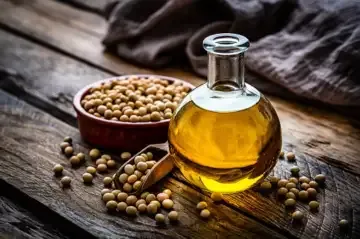While ghee has benefits, it's important to understand .
Ghee is made by simmering butter to remove water and milk solids. First, unsalted butter is melted in a pan over low heat. As it simmers, the water evaporates, and the milk solids separate and settle at the bottom. The clear, golden liquid left on top is ghee. This liquid is strained to remove the solids, leaving behind pure ghee, which has a rich, nutty flavour.
Ghee is high in saturated fat, with around 62% of its fat content being saturated. Studies have shown that excessive intake of saturated fats can increase LDL (bad) cholesterol, raising the risk of heart disease.

Ghee is made by simmering butter to remove water and milk solids. First, unsalted butter is melted in a pan over low heat. (Photo: Getty Images)"Ghee is high in concentrated fat and lacks the essential fatty acids that are present in oils. Since it lacks unsaturated fats like monounsaturated and polyunsaturated fats, getting so much amount of saturated fats from a single source on a daily basis isn't healthy," said nutritionist Neelanjana Singh.
High amounts of , which further deepens the risk of heart disease and stroke.
On the other hand, cooking oils like olive, sunflower, and mustard oil contain unsaturated fats, which help lower LDL cholesterol and support heart health. These oils also contain beneficial omega-3 and omega-6 fatty acids, which ghee lacks in sufficient amounts.
"Oil consumption has often been blamed as one of the causes of heart disease. But it's not really true. Oils are essential in our diet as they are a and also help in the absorption of fat-soluble vitamins like vitamins A, D, E and K. Moderate amounts of oil intake are extremely important for skin health, cell membrane structure and integrity, while also being essential for brain function," said Dr Varun Bansal is Consultant Cardiac Surgeon, Indraprastha Apollo Hospital.

Cooking oils like olive, sunflower, and mustard oil contain unsaturated fats, which help lower LDL cholesterol and support heart health. (Photo: Getty Images)Another crucial point is ghee's smoke point, around 250 degrees Celsius. While this is higher than butter, many oils like canola or avocado oil have even higher smoke points, making them safer for high-temperature cooking.
When oils or fats reach their smoke point, they begin to break down, releasing harmful compounds and free radicals that can damage cells and increase the risk of inflammation.
Besides this, oils are more versatile in providing a balance of fats. For example, extra virgin olive oil is rich in antioxidants like vitamin E and polyphenols, which contribute to reducing oxidative stress and inflammation.
Ghee, in comparison, doesn't provide these same benefits in cooking.
While ghee is perfect for spreading over paranthas or finishing off dishes, it's best to use heart-healthy oils for your regular cooking to maintain better nutrition and long-term health.

 Ghee is made by simmering butter to remove water and milk solids. First, unsalted butter is melted in a pan over low heat. (Photo: Getty Images)"Ghee is high in concentrated fat and lacks the essential fatty acids that are present in oils. Since it lacks unsaturated fats like monounsaturated and polyunsaturated fats, getting so much amount of saturated fats from a single source on a daily basis isn't healthy," said nutritionist Neelanjana Singh.
High amounts of , which further deepens the risk of heart disease and stroke.
On the other hand, cooking oils like olive, sunflower, and mustard oil contain unsaturated fats, which help lower LDL cholesterol and support heart health. These oils also contain beneficial omega-3 and omega-6 fatty acids, which ghee lacks in sufficient amounts.
"Oil consumption has often been blamed as one of the causes of heart disease. But it's not really true. Oils are essential in our diet as they are a and also help in the absorption of fat-soluble vitamins like vitamins A, D, E and K. Moderate amounts of oil intake are extremely important for skin health, cell membrane structure and integrity, while also being essential for brain function," said Dr Varun Bansal is Consultant Cardiac Surgeon, Indraprastha Apollo Hospital.
Ghee is made by simmering butter to remove water and milk solids. First, unsalted butter is melted in a pan over low heat. (Photo: Getty Images)"Ghee is high in concentrated fat and lacks the essential fatty acids that are present in oils. Since it lacks unsaturated fats like monounsaturated and polyunsaturated fats, getting so much amount of saturated fats from a single source on a daily basis isn't healthy," said nutritionist Neelanjana Singh.
High amounts of , which further deepens the risk of heart disease and stroke.
On the other hand, cooking oils like olive, sunflower, and mustard oil contain unsaturated fats, which help lower LDL cholesterol and support heart health. These oils also contain beneficial omega-3 and omega-6 fatty acids, which ghee lacks in sufficient amounts.
"Oil consumption has often been blamed as one of the causes of heart disease. But it's not really true. Oils are essential in our diet as they are a and also help in the absorption of fat-soluble vitamins like vitamins A, D, E and K. Moderate amounts of oil intake are extremely important for skin health, cell membrane structure and integrity, while also being essential for brain function," said Dr Varun Bansal is Consultant Cardiac Surgeon, Indraprastha Apollo Hospital.
 Cooking oils like olive, sunflower, and mustard oil contain unsaturated fats, which help lower LDL cholesterol and support heart health. (Photo: Getty Images)Another crucial point is ghee's smoke point, around 250 degrees Celsius. While this is higher than butter, many oils like canola or avocado oil have even higher smoke points, making them safer for high-temperature cooking.
When oils or fats reach their smoke point, they begin to break down, releasing harmful compounds and free radicals that can damage cells and increase the risk of inflammation.
Besides this, oils are more versatile in providing a balance of fats. For example, extra virgin olive oil is rich in antioxidants like vitamin E and polyphenols, which contribute to reducing oxidative stress and inflammation.
Ghee, in comparison, doesn't provide these same benefits in cooking.
While ghee is perfect for spreading over paranthas or finishing off dishes, it's best to use heart-healthy oils for your regular cooking to maintain better nutrition and long-term health.
Cooking oils like olive, sunflower, and mustard oil contain unsaturated fats, which help lower LDL cholesterol and support heart health. (Photo: Getty Images)Another crucial point is ghee's smoke point, around 250 degrees Celsius. While this is higher than butter, many oils like canola or avocado oil have even higher smoke points, making them safer for high-temperature cooking.
When oils or fats reach their smoke point, they begin to break down, releasing harmful compounds and free radicals that can damage cells and increase the risk of inflammation.
Besides this, oils are more versatile in providing a balance of fats. For example, extra virgin olive oil is rich in antioxidants like vitamin E and polyphenols, which contribute to reducing oxidative stress and inflammation.
Ghee, in comparison, doesn't provide these same benefits in cooking.
While ghee is perfect for spreading over paranthas or finishing off dishes, it's best to use heart-healthy oils for your regular cooking to maintain better nutrition and long-term health.